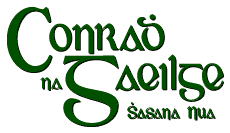 |
Foirmeacha Táite Ghaeilge
These forms are hardly ever used in modern Irish except in Munster, except in reply to questions. They are seen more often in writing , especially the writing of poetry where they may suit the rhythm or form of the verse better than the analytic form. However many good speakers understand the synthetic form, particularly older people.
Irish Synthetic Verb FormsThe tendency over the last century is for the verb to separate from the pronoun (The pronoun muid is said to have come about as a result of this tendency to separation) Forms like "Bíonn mé" are very common now.
Gaeilge Chorca Dhuibhne is another story entirely. The foirm tháite is alive and well there. The coibhneasta (direct relative form) is not used in that dialect.
Gaeilge Uladh makes limited use of the synthetic form and the coibhneasta, and has a historic present tense not found in the other dialects.
Some of the endings in this chart come from the book Gaeilge Chois Fhairrge-An Deilbhíocht by Tomás de Bhaldraithe, a study that was done in the late 1930s and early 1940s. It was based on collected samples of speech in an area fifteen or twenty miles east of Ros Muc. The old spelling was used in this study. Forms which are found in de Bhaldraithe, but not very common in print, are marked with an asterisk*. A standard form is enclosed in [brackets]
The verb bí is given in the chart as well, since it is so common; the negative and dependent forms are not given but can be easily ascertained, since the roots are the same as in the analytic form.
NOTE: Two dashes mean that one uses the analytic (separated) form of the verb.
Aimsirí Príomha (Primary Tenses)
Táscach Láithreach (Present Indicative) An chéad réimniú
(first conjugation, "short" verbs)An dara réimniú
(second conjugation,"long"verbs)bí 1 sg. -(a)im -im táim, tá mé 2 sg. -(a)ir -(a)in(n)s* -ins,-ir táir, táis, tá tú 3 sg. -(e)ann sé/sí -íonn sé/sí tá sé/sí 1 pl. -(a)imid -(a)íonn muid tá muid
[táimid]2 pl. -(e)ann sibh -(a)íonn sibh tá sibh 3 pl. -(a)id -(a)íonn siad táid, tádar*
tá siadSB -t(e)ar -it(h)ear*. [-(a)ítear] táthar, tádh*
táú* táifear*Foirm Choibhneasta
(Direct relative form)(1) -(e)as or -(e)anns (2) íonns, íos atá Táscach Fáistineach (Future Indicative) An chéad réimniú
(first conjugation, "short" verbs)An dara réimniú
(second conjugation,"long"verbs)bí 1 sg. -f(e)ad -ód, -eod beid 2 sg. --f(a)is OR -f(a)ir -óis , -óir -eoir,-eois beidhir 3 sg. -f(a)idh -óidh,-eoidh beidh sé/sí Ní bhíonn an fhoirm tháite san iolra SB -f(e)ar -faidhear* -ofar,-óthar* -eothar * beidhfear*
beifearFoirm Choibhneasta
(Direct relative form)-f(e)as -ós bheidhfeas*
bheasOrdaitheach (Command form) An chéad réimniú
(first conjugation, "short" verbs)An dara réimniú
(second conjugation,"long"verbs)bí 1 sg. -(a)im -ím bím 2 sg. --- -ígh bí 3 sg. -(e)adh -íodh bíodh sé/sí 1pl. -amuid*-(a)imid [-(a)imis] -íomuid*,-ímid [-imis] bíomaid *
[bímis]2 pl. -(a)idh*, -(a)igí -ígí bígí 3 pl. -(a)idis -ídís bídís SB -t(e)ar -ítear bítear Foshuiteach Láithreach (Present subjunctive) An chéad réimniú
(first conjugation, "short" verbs)An dara réimniú
(second conjugation,"long"verbs)bí 1 sg. -e , -a -í go raibh mé
go mbí * mé2 sg. -(a)is, -(a)ir -- go raibh tú 3 sg. -- -- go raibh sé/sí 1pl. -(a)imid -- go raibh muid
[go rabhaimid]2 pl. -- -- go raibh sibh 3 pl. -- --
go raibh siadSB -t(e)ar -ítear go rabhthar
Aimsirí Stairiúla (Historic Tenses)
Táscach Caite (Past Indicative) An chéad réimniú
(first conjugation, "short" verbs)An dara réimniú
(second conjugation,"long"verbs)bí 1 sg. -(e)as -íos, -as bhíos 2 sg. -ais, -ir -ís, -ír bhís, bhír 3 sg. -- -igh bhí sé/sí 1 pl. -- -- bhí muid
[bhíomar]2 pl. -- -- bhí sibh 3 pl. -(e)dar -íodar, -adar, -odar bhíodar
bhí siadSB -(e)adh -íodh, -eadh bhíú*, bhíothadh
[bhiothas]Táscach Gnáthchaite agus Foshuiteach Chaite
(Past Habitual and Past Subjunctive)An chéad réimniú
(first conjugation, "short" verbs)An dara réimniú
(second conjugation,"long"verbs)bí
(fosh. chaite. follows dá)1 sg. -(a)inn -(a)ínn bhínn, dá mbeinn
2 sg. -t(e)á, -theá* -(a)íteá bhíteá. dá mbíteá
dá mbeifeá3 sg. - (e)adh -íodh bhiodh sé/sí dá mbeadh sé/sí
1 pl. -- -- bhiodh muid
[bhímis]dá [mbeimis]/ mbeadh muid
2 pl. -- -- bhiodh sibh dá mbeadh sibh
3 pl. -(a)idís -(a)ídís bhídís, dá mbeidís
SB - t(a)í -ítí bhítí, dá mbítí
dá mbeifíCoinníollach (Conditional) An chéad réimniú
(first conjugation, "short" verbs)An dara réimniú
(second conjugation,"long"verbs)bí 1 sg. -f(a)inn -óinn bheinn 2 sg. -f(e)á -fá bheifeá, bheitheá* 3 sg. -fadh -ódh, -eodh bheadh sé/sí 1 pl. -- -- bheadh muid,
[bheimis]2 pl. -- -- bheadh sibh 3 pl. -f(a)idís -óidís,-eoidís bheidís,
bheadh siadSB -f(a)í -óifí ,-eofaí bheifí
Ar ais arís go barr an leathanaigh